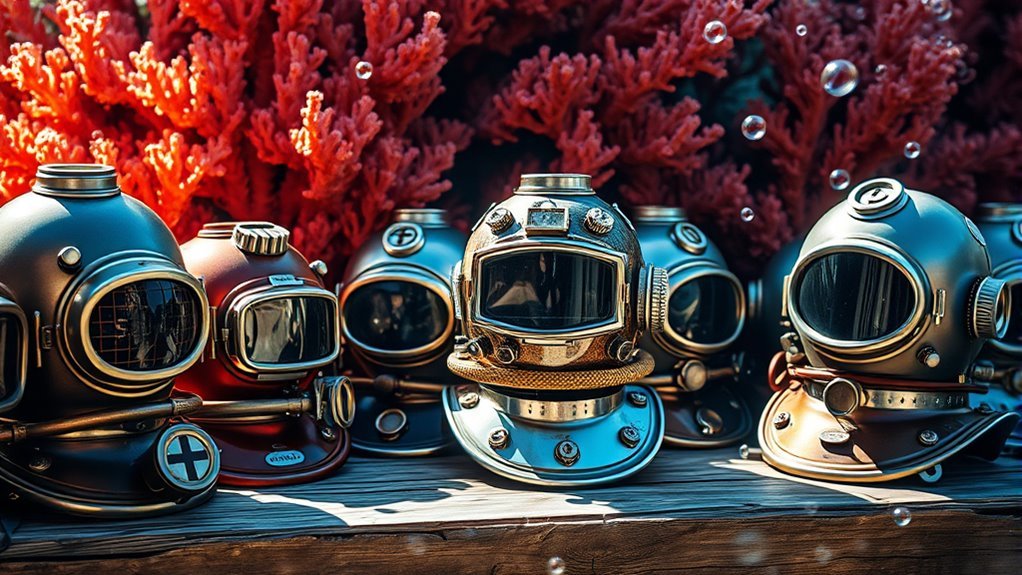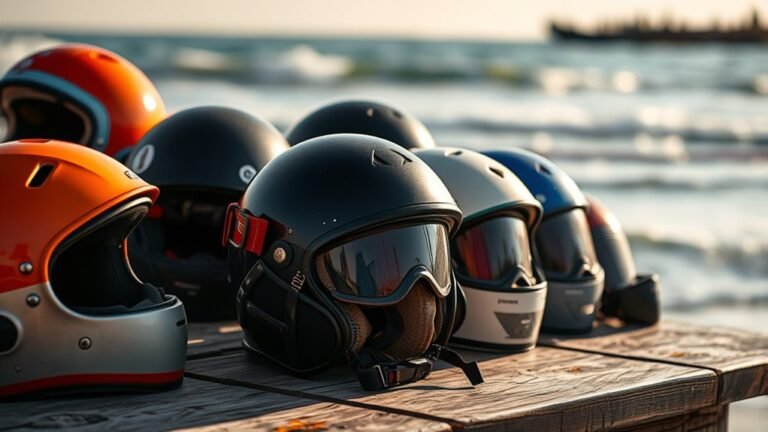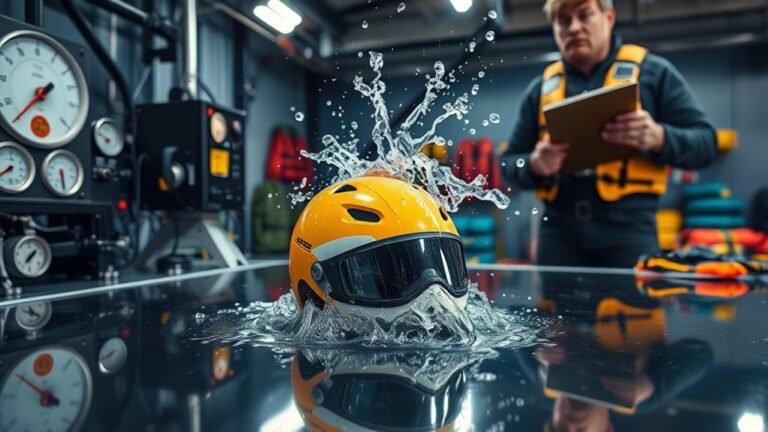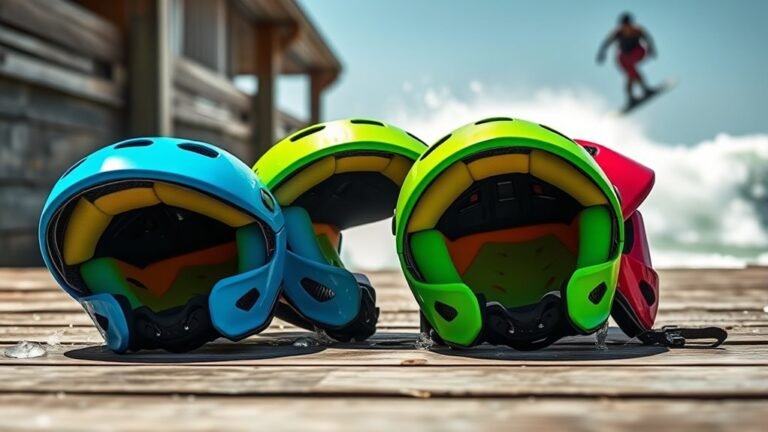Scuba Diving Helmets and Their Uses
Scuba diving helmets are essential for enhancing safety, visibility, and communication underwater. You’ll find various types, like full-face helmets for complete coverage and commercial helmets with advanced features for demanding tasks. Key elements include durable materials, ergonomic designs, and reliable communication systems. These helmets are vital in commercial diving operations and scientific explorations, and they offer recreational divers enhanced comfort and protection. If you want to explore their specific benefits and applications, keep going.
Types of Scuba Diving Helmets

When exploring the underwater world, the right scuba diving helmet is vital for safety and functionality. There are various types of helmets suited to different diving needs. Full-face helmets offer complete coverage, providing excellent visibility and communication options, which is essential for team dives. Half-helmets, on the other hand, are lighter and allow for more freedom of movement but lack the same level of protection. Another option is the commercial diving helmet, designed for deep-sea operations, featuring advanced safety features and air supply systems. Each type comes with unique benefits, such as enhanced safety, comfort, and adaptability to specific underwater conditions. Choosing the right helmet guarantees you can focus on enjoying your dive without compromising on protection.
Key Features of Scuba Diving Helmets
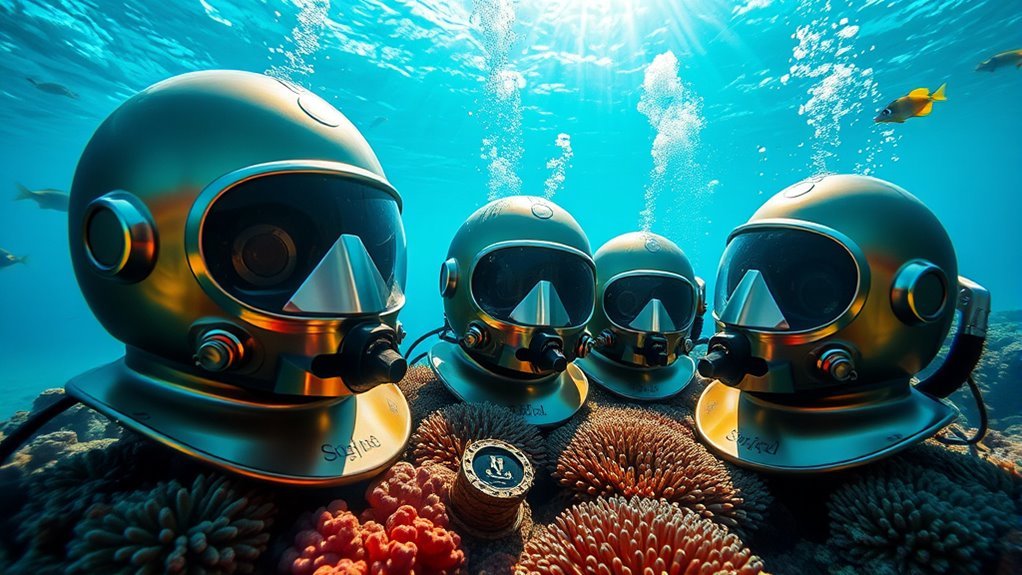
Selecting the right scuba diving helmet involves understanding its key features, which greatly impact performance and safety. You’ll want to pay attention to material durability; high-quality materials like stainless steel and polycarbonate guarantee longevity and resistance to underwater pressures. Design innovations also play an essential role, enhancing comfort and functionality. Look for features like a streamlined shape to reduce drag and an ergonomic fit for prolonged use. A good helmet should include a reliable communication system for seamless interaction with your dive team. Additionally, consider visibility; large faceplates can improve your peripheral view, increasing awareness of your surroundings. By understanding these key features, you’ll be better equipped to make informed choices for your diving adventures.
Applications in Commercial Diving
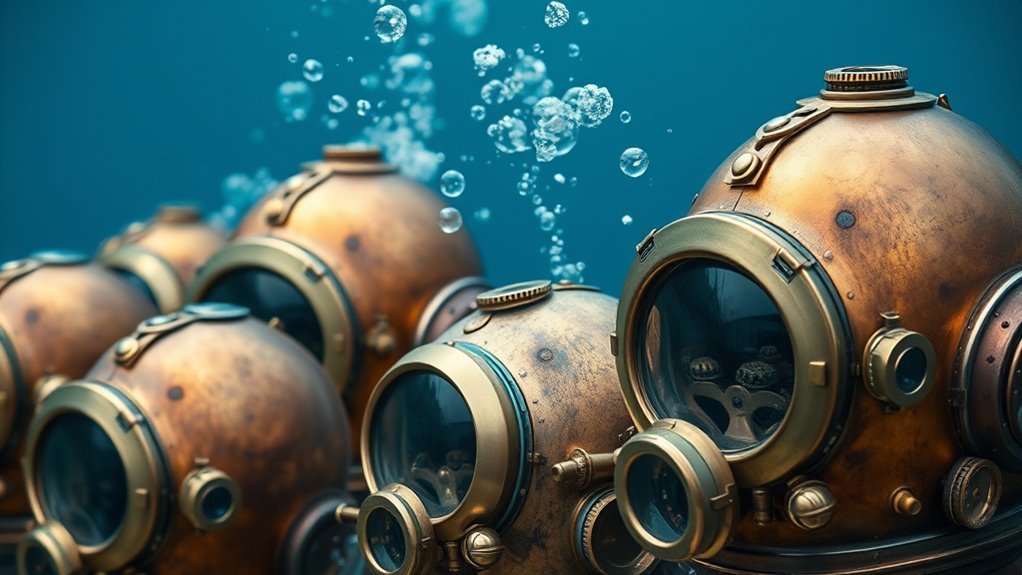
While the primary function of scuba diving helmets is to provide safety and communication underwater, their applications in commercial diving are vast and varied. In commercial operations, these helmets facilitate tasks like underwater welding, construction, and maintenance. They enable divers to work efficiently while adhering to stringent safety protocols. The helmets are equipped with communication systems, allowing for real-time coordination with surface teams, which is essential during high-stakes operations. Additionally, they protect divers from environmental hazards, ensuring they can perform their duties without compromising safety. By integrating advanced materials and technologies, scuba diving helmets enhance both performance and security, making them indispensable in the commercial diving industry. Ultimately, they empower divers to achieve more while prioritizing their safety.
Scientific Research and Exploration
As scientists investigate the mysteries of underwater ecosystems, scuba diving helmets play an essential role in facilitating scientific research and exploration. These helmets provide researchers with a reliable air supply and protection, allowing them to dive deeper and longer. In underwater archaeology, they enable archaeologists to study submerged sites with precision, uncovering artifacts that tell stories of past civilizations. For marine biology, scuba diving helmets offer the necessary safety and mobility to observe marine life in their natural habitats. This equipment allows for the collection of data on biodiversity, behavior, and ecosystem health. By using scuba diving helmets, you can expand your understanding of the ocean’s complexities while contributing to crucial research efforts that preserve our planet’s underwater heritage.
Recreational Uses of Scuba Diving Helmets
Scuba diving helmets not only serve scientific purposes but also enhance recreational diving experiences for enthusiasts. When you engage in recreational diving, these helmets provide a higher level of helmet safety compared to traditional masks. They enable you to explore underwater environments more comfortably and securely, allowing for longer dives without the constant need to surface. The design of modern helmets offers clear visibility and robust communication systems, making it easier to connect with your diving buddies. Additionally, they offer protection against potential hazards like debris and marine animals. With the right helmet, you can fully enjoy the freedom of underwater exploration, immersing yourself in vibrant marine ecosystems while prioritizing your safety and comfort.
Frequently Asked Questions
How Do I Choose the Right Scuba Diving Helmet Size?
To choose the right scuba diving helmet size, start by consulting a sizing guide specific to the helmet type you’re considering. Measure your head circumference accurately, as different scuba helmet types may have varying fit standards. Consider the intended use; for example, commercial helmets often require a snug fit, while recreational ones might allow for a bit more room. Finally, always try on the helmet if possible to guarantee comfort and proper seal.
Can Scuba Diving Helmets Be Used for Underwater Photography?
Yes, scuba diving helmets can be used for underwater photography, but you’ll need to contemplate specific helmet features. Look for helmets with built-in camera mounts or compatibility with external rigs. Additionally, verify the helmet provides a clear view and adequate lighting for capturing high-quality images. The right helmet allows freedom of movement while you focus on your shots, making it an excellent tool for underwater photography enthusiasts.
What Is the Lifespan of a Scuba Diving Helmet?
The lifespan of a scuba diving helmet typically ranges from 5 to 15 years, depending on helmet durability and maintenance. With advancements in helmet technology, modern helmets are designed to withstand harsh underwater conditions, but regular inspections are essential. If you’re using your helmet frequently, proper care can extend its life. Always check for wear and tear, as your safety underwater depends on the condition of your equipment.
Are There Specific Maintenance Tips for Scuba Diving Helmets?
Yes, there are specific maintenance tips for scuba diving helmets. Regularly inspect the helmet for cracks or wear, and clean it with fresh water after each use. Proper helmet storage is vital; keep it in a cool, dry place away from direct sunlight to prevent damage. Additionally, lubricate seals and valves to guarantee functionality. These maintenance practices can extend the lifespan of your helmet, assuring you enjoy the freedom of underwater exploration safely.
What Safety Certifications Should I Look for in a Scuba Diving Helmet?
When selecting a scuba diving helmet, look for safety certifications from reputable certification agencies like the American National Standards Institute (ANSI) or the European Committee for Standardization (CEN). These organizations establish safety standards that guarantee your helmet meets rigorous performance criteria. Make sure the helmet has passed tests for pressure resistance and impact protection. This’ll enhance your safety underwater and give you the freedom to explore without worrying about your equipment’s reliability.
